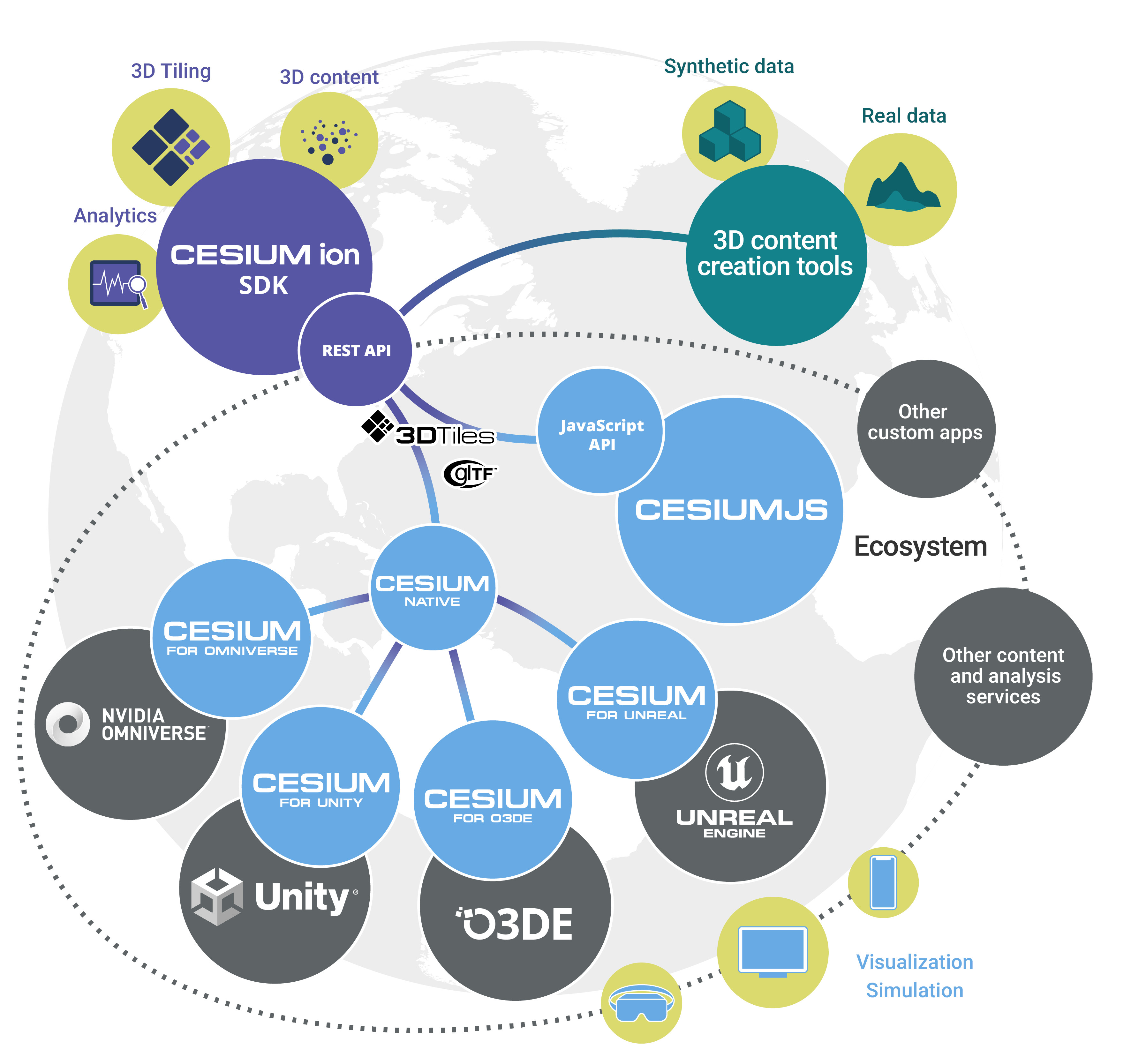Cesium Native
Cesium Native is a set of C++ libraries for 3D geospatial, including:
- 3D Tiles runtime streaming
- lightweight glTF serialization and deserialization, and
- high-precision 3D geospatial math types and functions, including support for global-scale WGS84 ellipsoids.
Cesium Native powers Cesium's runtime integrations for Cesium for Unreal, Cesium for Unity, Cesium for Omniverse, and Cesium for O3DE. Cesium Native is the foundational layer for any 3D geospatial software, especially those that want to stream 3D Tiles.
A high-level Cesium platform architecture with the runtime integrations powered by Cesium Native and streaming content from Cesium ion.
🗃️Libraries Overview
| Library | Description |
|---|---|
| Cesium3DTiles | Lightweight 3D Tiles classes. |
| Cesium3DTilesReader | 3D Tiles deserialization, including 3D Tiles extension support. |
| Cesium3DTilesWriter | 3D Tiles serialization, including 3D Tiles extension support. |
| Cesium3DTilesSelection | Runtime streaming, decoding, level of detail selection, culling, cache management, and decoding of 3D Tiles. |
| CesiumAsync | Classes for multi-threaded asynchronous tasks. |
| CesiumGeometry | Common 3D geometry classes; and bounds testing, intersection testing, and spatial indexing algorithms. |
| CesiumGeospatial | 3D geospatial math types and functions for ellipsoids, transforms, projections. |
| CesiumGltf | Lightweight glTF processing and optimization functions. |
| CesiumGltfReader | glTF deserialization / decoding, including glTF extension support (KHR_draco_mesh_compression etc). |
| CesiumGltfWriter | glTF serialization / encoding, including glTF extension support. |
| CesiumIonClient | Functions to access Cesium ion accounts and 3D tilesets using ion's REST API. |
| CesiumJsonReader | Reads JSON from a buffer into statically-typed classes. |
| CesiumJsonWriter | Writes JSON from statically-typed classes into a buffer. |
| CesiumUtility | Utility functions for JSON parsing, URI processing, etc. |
📗License
Apache 2.0. Cesium Native is free for both commercial and non-commercial use.
💻Developers
⭐Prerequisites
- Visual Studio 2017 (or newer), GCC v7.x+, Clang 10+. Other compilers may work but haven't been tested.
- CMake
- For best JPEG-decoding performance, you must have nasm installed so that CMake can find it. Everything will work fine without it, just slower.
🚀Getting Started
Clone the repo
Check out the repo with:
git clone git@github.com:CesiumGS/cesium-native.git --recurse-submodulesIf you forget the --recurse-submodules, nothing will work because the git submodules will be missing. You should be able to fix it with:
git submodule update --init --recursiveCompile
You can then build cesium-native on the command-line with CMake:
## Windows compilation using Visual Studio
cmake -B build -S . -G "Visual Studio 15 2017 Win64"
cmake --build build --config Debug
cmake --build build --config Release
## Linux compilation
cmake -B build -S .
cmake --build buildOr, you can easily build it in Visual Studio Code with the CMake Tools extension installed. It should prompt you to generate project files from CMake. On Windows, choose Visual Studio 2017 Release - amd64 as the kit to build. Or choose an appropriate kit for your platform. Then press Ctrl-Shift-P and execute the CMake: Build task or press F7.
Generate Documentation
- Install Doxygen.
- Run:
cmake --build build --target cesium-native-docs - Open
build/doc/html/index.html

